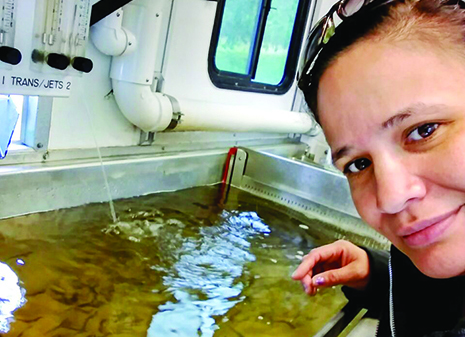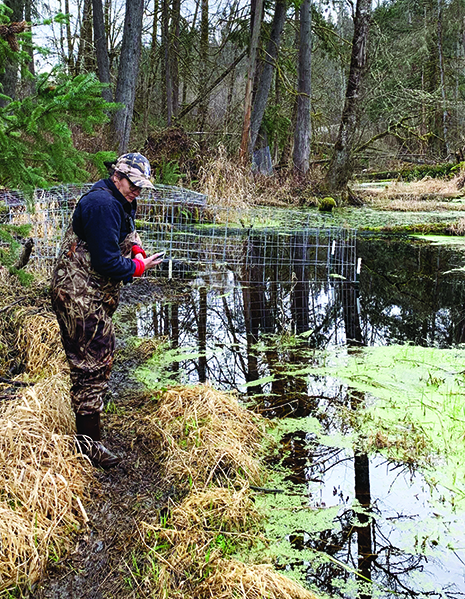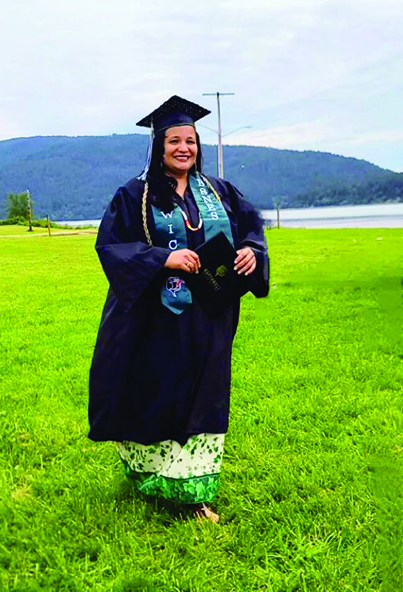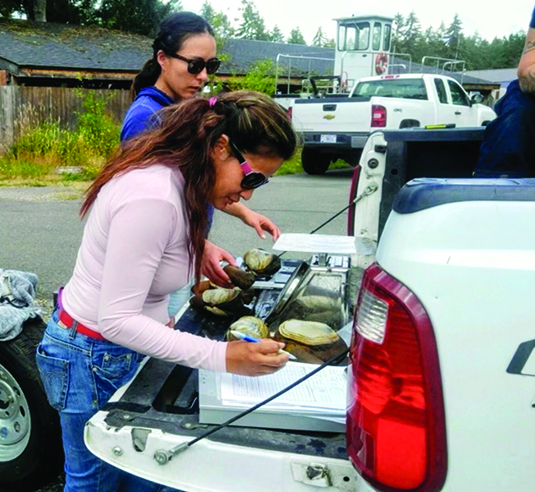
By Shaelyn Smead; photos courtesy of Teesha Osias
Protecting Mother Earth is a priority for Native Americans and many environmental justice groups. Tulalip tribal member Teesha Osias is enhancing the Native presence in environmental work by reinventing herself and investing in her future.
From 1999 to 2022, Teesha overcame many obstacles and worked diligently to receive an education. She earned an Associate of Arts, Associate of Applied Science, and Bachelor of Science in Native Environmental Science from Northwest Indian College (NWIC). Her education has taught her to uphold treaties and inherent rights by protecting the natural world. She took on holistic training in Native Environmental Science through Indigenous research and content knowledge. After 23 years of sacrificing her time, efforts, and mental state, she achieved something great; an education, a future for her family, and paving a path for future Native biologists.
However, Teesha didn’t always have the confidence to reach her goals. She shared about her difficult childhood and its lack of stability. Her family moved so often that adjusting to each new school’s curriculum became difficult for her. Eventually in her teens, between falling behind in school and running with the wrong crowd, Teesha withdrew and enrolled with Job Corps.
“School was never easy for me. I felt like I was always struggling. But I finally felt comfortable with Job Corps and like I could achieve more. It started a little fire in me. They gave me the tools and things necessary to believe in myself again.”

At 20 years old, Teesha decided to return to school and earn her GED. Teesha remembered speaking with a teacher about becoming a Biologist and the unwavering look she received from them. Even though it was clear her teacher didn’t believe in her, she believed in herself. Venturing into the science world always seemed like a forbidden concept, but she knew she would eventually get there by accomplishing small goals at a time.
Unfortunately, Teesha’s struggles didn’t stop there. While in college, she dealt with troublesome relationships, homelessness, and raising three kids. She felt like she was in survival mode. At many points, she wanted to quit and even spoke about ripping up her papers and textbooks out of defeat. Finally, what felt like a light at the end of the tunnel, a friend offered her a job working on their fishing boat.
“I fell in love with the work. It was empowering, and it saved me. I remember hearing other tribal members speak about why our voice is important regarding our land and fish and how we needed more Natives in the Natural Resources department. The experience reignited my passion for biology and reminded me of what I was doing this for. I didn’t want to let my community down. I wanted to continue my education to help my people and not have that ‘what if’ feeling looming over my head. Plus, I had six little eyeballs [her kids] watching me. What would that be teaching them?”
Being a single mom and working full-time, Teesha had a heavy load. Additionally, the NWIC Tulalip satellite location could only partially provide certain science lab technology and tools required for her classwork and had to rely on other sources. With these obstacles, she sometimes took as little as one course per school quarter to keep inching toward her degree.
“Many people would poke fun at me, calling me a ‘professional student’ and would give me grief for taking so long to finish school. But you have to fight for what you want, and that’s exactly what I did. You can move mountains with just a pebble a day.”

Teesha expressed how NWIC helped her find her Indigenous voice. They educated her on food sovereignty, treaty and fishing rights, basket weaving, and other cultural knowledge. She was exposed to new books by Native authors that impacted how she saw the world and the importance of Indigenous mentalities. Concepts that combined modern-day environmental solutions with the Native traditional ways of life.
While Teesha earned her degree, she spent much time interning in different areas within Tulalip Natural Resources. She helped work on lumber management in forestry, collecting milt and acting as a fish technician in the hatchery, measuring and evaluating geoducks by the bay, assisting on the Elwha Dam removal project, spearheading many environmental surveys and projects, and helping Wetland Program Coordinator Allison Warner and Environmental Wetland Biologist Michelle Bahnick on wetland preservation and land development.
“This work feels a part of me like it’s in my DNA. I know this work’s importance and think this connection manifested through my ancestors. It makes such a difference when you touch your land. We belong out here doing what Indians do.”

Working closely with nature, preserving the environment, and identifying climate indicators have played a significant factor in Native American culture. Even though Teesha grew up in the city, being involved in this field has given her new life. She knows there is still plenty of room to grow and learn and expressed her gratitude to Allison and Michelle for allowing her to take her ‘training wheels’ off.
Allison spoke of her time with Teesha and her hopes for more tribal members to get involved with environmental departments, “It has been a pleasure working with Teesha. Her story is inspirational. I’m excited to think that in the future, more tribal scientists will be filling these roles in our natural resources departments .”
Amid everything, Teesha has also taken opportunities to work with Native youth to teach them about the wetlands and will be helping plant trees with Native students later this month. She is impacting Native students by exposing the many paths of environmental work. She’s a living example that scientific careers are attainable for Native youth and inspires them to get involved. She speaks of her dreams where her people come together and play a dominant role in every department to take care of our home again.
Teesha is a great example of how powerful perseverance and patience can be. Despite the many reasons life gave her to quit, Teesha had the tenacity to continue being the force she was and continues to be.